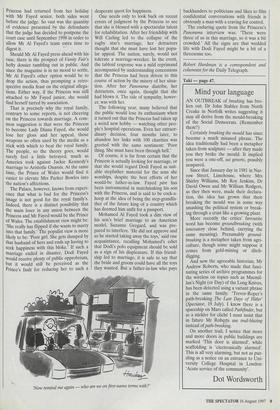Mind your language
AN OUTBREAK of breaking has bro- ken out. Dr John Stables from North Creake in Norfolk writes suggesting it may all derive from the mould-breaking of the Social Democrats. (Remember them?) Certainly breaking the mould has since become a much misused phrase. The idea traditionally had been a metaphor taken from sculpture — after they made you they broke the mould. It implied you were a one-off, sui generis, possibly nonpareil.
Since that January day in 1981 in Nar- row Street, Limehouse, where Mrs Shirley Williams, Mr Roy Jenkins, Dr David Owen and Mr William Rodgers, as they then were, made their declara- tion, the idea has grown that their breaking the mould was in some way smashing the political system or break- ing through a crust like a growing plant.
More recently the critics' favourite word has become groundbreaking (with innovatory close behind, carrying the same meaning). Presumably ground- breaking is a metaphor taken from agri- culture, though some might suppose it comes from gold-mining or ditch- digging.
And now the agreeable historian, Mr Andrew Roberts, who made that fasci- nating series of archive programmes for the wireless on topics such as Macmil- lan's Night (or Day) of the Long Knives, has been detected using a variant phrase in the same family: 'Trevor-Roper's path-breaking The Last Days of Hitler' (Spectator, 19 July). I know there is a spaceship on Mars called Pathfinder, but as a stickler for cliché I must insist that in future Mr Roberts use trail-blazing instead of path-breaking.
On another trail, I notice that more and more doors in public buildings are marked 'This door is alarmed', while scaffolding is 'electronically alarmed'. This is all very alarming, but not as puz- zling as a notice on an entrance to Uni- versity College Hospital in London: `Acute service of the community'.
Dot Wordsworth


























































 Previous page
Previous page